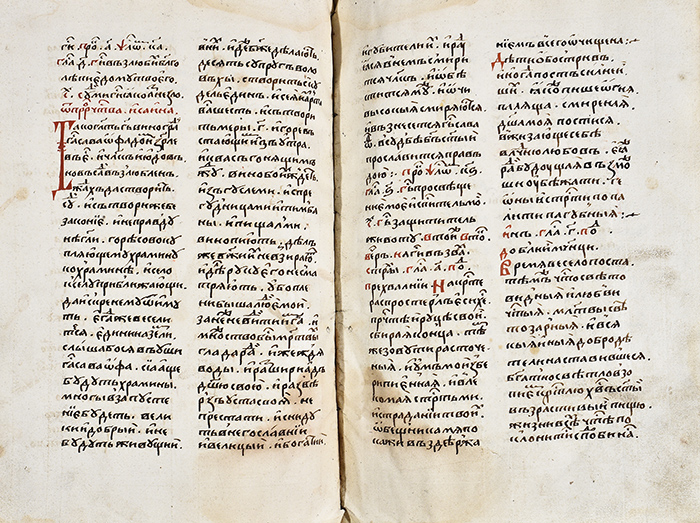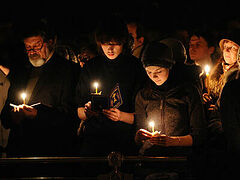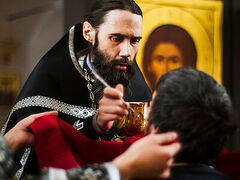 The Lenten Triodion. Mid-sixteenth century
The Lenten Triodion. Mid-sixteenth century
We’re coming to the end of the Second week of Lent. On the one hand, of course, it is much lighter than the first one.
On the other hand, I think many people have noticed that on the First week it seems as if you are being carried along by a strong, swift current. The days pass slowly and majestically by—Clean Monday, Clean Tuesday… These are transparently bright, crystal, and truly spring days, and you fear bringing any impurity into them—if only to get rid of the impurity you have accumulated. It is getting dusk, and the Canon of St. Andrew of Crete is heard, reminding us again and again: “It’s a special time, these are special days! Hurry up, O soul! Awaken, it’s time, it’s time!”
But the Second Week begins, and the brisk rhythm seems to be disappearing. We fall out of the rhythm, our spirits fail, we relax, our prayer becomes less intense, Monday is already not so different from Wednesday or Thursday, and Tuesday from Friday. It’s as if the core has been removed, and our Lenten concentration and firmness of purpose slowly begin to cool and fall. True, we will get another strong impulse on Sunday of the Veneration of the Holy Cross, and then the great days of Holy Week will be a stone’s throw away.
But still, we want to spend the intermediate weeks freshly, intently and in a self-disciplined manner.
It appears that there is a little secret for how to achieve this. It won’t even require extra effort. All you need is:
1. to find the texts of the Lenten Triodion;
2. to find the three-ode canons to be read on each day of the week;
3. to include them in your daily prayer rule.
Some will say: “But we already had the Canon of St. Andrew of Crete.” Yes, but the canons of the Lenten Triodion are unique. And besides, they are shorter—each has only three odes, and not eight or nine.
Let’s try and open the canons of the Second Week at random:
“Pure fasting, the removal of sin, the alienation from passions, love for God, diligence in prayer, tears with compunction and care for the poor, as Christ bequeathed us in the scriptures.”
But this is an all-encompassing program for Lent! And have you noticed? Not a word about food. It is important to note it.
Alas, I think it has long been no secret to anyone that it is easier to struggle with lactic acid insidiously penetrating bread than with anger; it is easier to detect egg white (000.1%) in a cracker, than the poison of condemnation in our own words; and it is more comfortable to fight with a drop of oil in a salad than with our indifference.
But with such texts in front of our eyes (and they are even updated every day) it will certainly be much more difficult for us to reduce fasting to a diet.
“Having the Holy Spirit, the Guest of the fast, let us be satisfied with His gifts and enjoy them richly, praising Him as our God.”
“That’s the level! No, such heights are not for us; they are for eagles, and we will plod along on the ground slowly,” we will sigh.
Okay, then here’s the minimum program:
“We fast with true fasting, as we abstain from food, so we distance ourselves from the tongue, rage and lies and every other passion, so that we may see Pascha in purity.”
It seems these are quite simple things, but they already give us the opportunity to see the Risen Christ with pure eyes. Let’s start?
The canons of the Lenten Triodion also greatly help us keep ourselves in a state of “good tension”, as St. Theophan the Recluse taught.
You bet. After all, if you don’t read the canon for Tuesday of the Second Week today, then tomorrow will be the canon for Wednesday. You despite yourself get a feeling of the uniqueness of each day of Lent and its value. You start worrying: “I mustn’t miss it!”
Not to mention the fact that these amazing texts are so poetic and capacious! No wonder the writer Nikolai Gogol (1809–1852), that wonderful master of words, advised the poet Nikolai Yazykov:
“Read church books and stop where a lofty unexpected word or expression strikes you. It will be the door to a great journey.”
Well, shall we try it? May St. Theodore the Studite and other authors of the canons of the Triodion help us!



